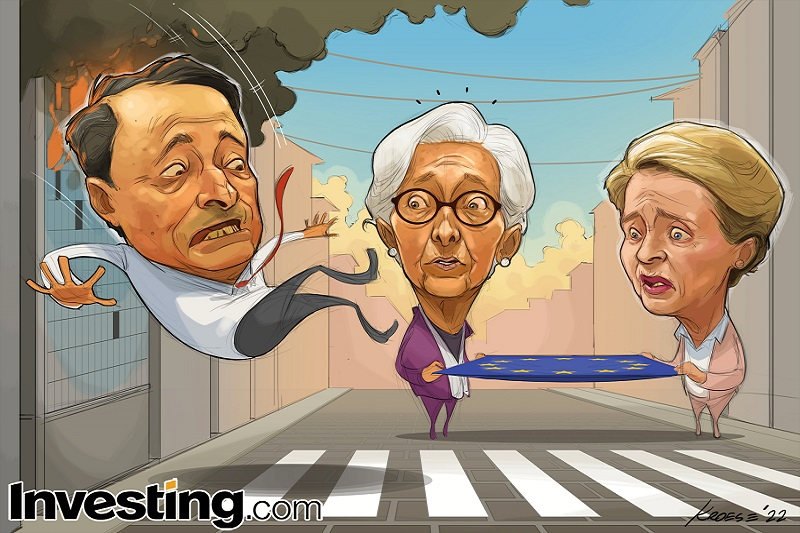Weekly Comic: Draghi Departs Despite Staunch European Support
2022.07.26 17:09

© Investing.com
By Scott Kanowsky
Investing.com — “Poor Italy” is the trending lament on Twitter in the wake of the country’s latest political drama. But perhaps “Poor Draghi” would be closer to the mark.
Mario Draghi, the prime minister of Italy, resigned from the post last week after three of the parties he originally partnered with to form a national unity government boycotted a confidence vote. In the immediate aftermath of his departure, Draghi received sympathies at home and abroad.
An Italian newspaper hit out at Draghi’s opponents for having “drowned” the 74-year old former European Central Bank president. Another said he had been “betrayed.”
In Britain, Draghi was compared to Ancient Rome’s greatest figures. The Financial Times cast him as Cincinnatus, a man coaxed out of retirement to respond to a nation’s plea for help. The Guardian likened Draghi to Julius Caesar, saying he had been “stabbed in the back” by lesser politicians.
These are warranted takes. Even as he exits the stage, Draghi rightfully retains widespread admiration for his notable leadership in some of Europe’s most troubling times.
As ECB president, he vowed to do “whatever it takes” to save the Eurozone. This month marks exactly 10 years since that famous – and ultimately fulfilled – promise.
Then, as premier starting in February 2021, he gave renewed purpose to Italy’s pandemic response and convinced the European Union to allocate 200 billion euros in badly-needed post-Covid bailout funds to the country. He was also a consistent, outspoken critic of Russia’s invasion of Ukraine, flying in the face of energy supply concerns and the ties some of his colleagues enjoy with the Kremlin.
But Draghi sparred with his coalition members, which included the anti-establishment Five Star Movement, the center-left Democratic party, and the right-wing League led by populist firebrand Matteo Salvini. Talks over domestic issues like property tax collection and beach concessions proved particularly knotty.
A final appeal for his reform agenda, which featured controversial elements like income subsidy cuts and the opening of local trade monopolies up to competition, failed to garner support. Backing for his government shortly evaporated.
The turmoil in Rome rocked already fragile Italian debt markets. The yield on the 10-year benchmark bond jumped, widening the all-important premium between its German equivalent that is used to judge the risk of Italy being forced out of the Eurozone due to its enormous debt load.
The collapse of Draghi’s government came despite the best efforts of his supporters outside of Italy, namely EU Commission president Ursula von der Leyen and his successor at the ECB, Christine Lagarde.
In June, von der Leyen effusively praised Draghi, telling Italian media that “he is a true European and has great experience.” She added that cooperation between Draghi and Brussels is “really important.”
It certainly is. Draghi was thrust into the spotlight partly to negotiate the reforms necessary to secure Italy its haul of the massive EU pandemic recovery fund.
Rome is the program’s largest recipient, meaning its overall success will largely be determined by how it helps the Italian economy. Draghi’s exit thus casts doubt over the EU’s ambitious aid plans for the bloc as a whole.
Meanwhile, the ECB has unveiled a new tool designed to prevent a blowout in peripheral Eurozone debt markets – particularly in Italy – and their wealthier counterparts elsewhere in the currency area.
The end of Draghi’s time in office will make that task even more complicated. The central bank’s new instrument comes with a detailed list of eligibility criteria, like fiscal sustainability and a lack of macroeconomic imbalances, that Italy’s new leader may not be willing to follow.
“This is a strong set of potential tripwires, the subject of much analysis in coming months – important but not insuperable hurdles for the next Italian government,” wrote David March and Ellie Groves at the London-based think-tank Official Monetary and Financial Institutions Forum.
Italy now faces an uncertain future. But they are not leaderless: Draghi will stay on as caretaker prime minister until snap elections on September 25.
Whether or not the legacy of the reforms he pursued so assiduously will live on remains to be seen.
Poor Draghi, indeed.








